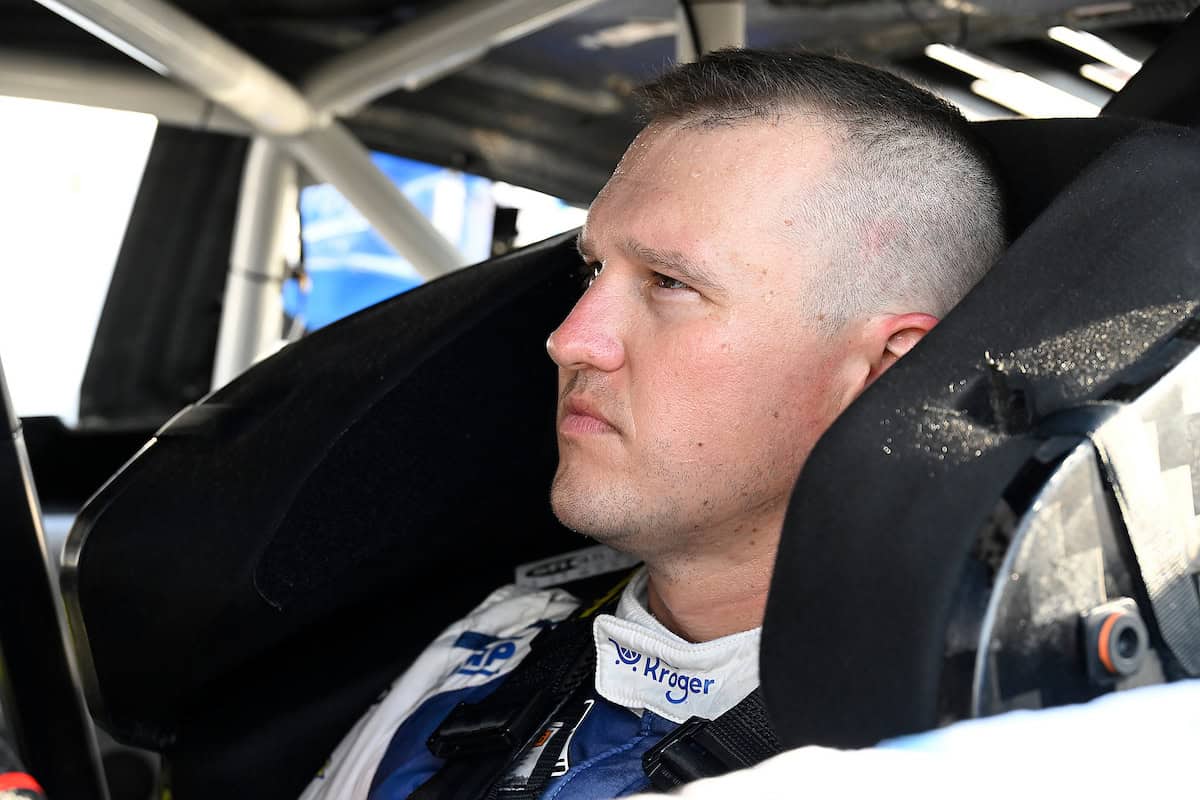The NASCAR Cup Series concluded its regular season last Saturday night under the lights at Daytona International Speedway in thrilling fashion.
Ryan Blaney made a two-lap run from 13th to the win, edging Daniel Suarez, Justin Haley and Cole Custer in a four-wide finish and ending their playoff hopes, along with several others.
This weekend at Darlington Raceway, 16 drivers will take their first step in fighting for the 2025 championship. There will be some notable names missing from that group, though they’ll still be running the final 10 races looking to take their teams to victory lane before the offseason.
This begs the question: Is the season a failure if a team doesn’t make the playoffs?
Our writers here at Frontstretch took some time this week to weigh in.
Yes, because you’ll never see them if they don’t.
As NASCAR’s playoffs loom, the final 10 races of the season hold a multitude of possibilities. Sixteen teams will race as hard as they can every week for the wins that guarantee they will move to the next round, one step closer to their lifelong dream of a title, or to NASCAR immortality as a multi-time champion.
They’ll be the stars of the show, with race broadcasts focusing on their every move.
For the other 20 teams, the season might as well be over.
That might be an exaggeration, and it’s a toxic mentality for the sport, but it’s not just teams or their fans being dramatic. Because starting Sunday night at Darlington Raceway, unless one of them is doing something special, as far as the TV broadcast is concerned, they barely exist.
Take Ryan Preece, for example.
After taking the reins of RFK Racing’s new No. 60 for 2025, Preece has had a career year. He’s already doubled his previous season-high in top 10s and improved his average finish by more than four positions over his career best.
His average start is up seven spots over last year and he’s inside the top 20 in points after the playoff reset, having climbed as high as 12th in the standings before missing the playoffs after three drivers outside the top 16 edged him with wins.
With that has come TV time. Preece has been mentioned more and more on race broadcasts as he’s run better, particularly last weekend at Daytona, where he led briefly late in his last-ditch bid to make the payoffs. His hard, smart driving style garnered some attention from the broadcast booth.
From that standpoint, it’s hard to view his season as a failure. The same goes for drivers like his teammate Chris Buescher, who was in the top 10 in points after Daytona before the reset. A top 10 points season, especially for a team like RFK that is rebuilding after being a couple of steps behind the Joe Gibbs Racing and Hendrick Motorsports crowd.
But from here on out, if they aren’t winning or crashing, their fans — and their sponsors — will be lucky to hear their names on a broadcast.
They’ll get a brief mention if they’re battling a playoff driver or having a great run, but since NASCAR has had some form of short-form title race, the drivers who don’t make it seem to vanish off the face of the earth for 10 weeks.
On the surface, that seems fair enough: they missed the cut. Except NASCAR only eliminates them from title contention, not from competition, the way stick-and-ball teams are.
That means teams, who all rely on sponsors to fund them, sell sponsorship based on a 36-race season. A major part of the sponsors’ return on investment comes from airtime. When their car is on the television screen, that’s as valuable as paid commercial time. If the car runs well and is on-screen often, that time adds up to more than what they’d get from a few 30-second ad spots that fans often don’t even watch.
When the car isn’t getting any airtime, though, the sponsors aren’t getting any eyeballs. Ten weeks of that suddenly doesn’t seem like as valuable an investment. Full-season sponsors are all but gone in NASCAR’s top series, and races are a hard sell if airtime is questionable.
Every team’s sponsor deals are different, but it’s safe to say that there are perks to making the playoffs, whether that’s monetary incentives or simply sponsor longevity.
The other way that teams take a hit by missing the playoffs is in charter value, with NASCAR placing a higher value on charters with the best points finishes in a defined period. For a driver like Buescher, who was in the top 10 but now can finish no higher than 17th, that’s a sizeable difference.
Who else takes a hit in all of this?
The fans.
All of the drivers have their diehards, and it can’t be a great fan experience to know your driver will be the Invisible Man for the rest of the year.
Meanwhile, those teams outside the playoffs are working just as hard on and off the track as the playoff teams. For many of them, the shop crew is not only preparing cars for the rest of this year but beginning to plan and prepare for 2026. The work doesn’t get lighter and the drivers don’t stop trying.
Missing the playoffs isn’t a failure because the team won’t win the title. Only one team is doing that anyway.
Missing the show doesn’t mean a lost season for everyone. For some teams, where a playoff run is the icing on the cake and the goal is improvement and building, missing out isn’t a lost season. They’re making sponsorship deals knowing where they stand and perhaps without the same expectations. A 20th-place season isn’t a bad year for them, it might be a good one.
But for the teams that just miss out despite a strong season? Failure might be a strong word, but there are very real implications. For any of their fans? The message is that they should be grateful for a fleeting glimpse among the title hopefuls.
From here on out, the only drivers that seem to matter at all to NASCAR or the broadcast media are the playoff teams. Miss out, and good luck getting more than a passing mention. And that only makes the disparity greater.
– Amy Henderson
No, it’s not the end of the world.
How many times have we heard the phrase “the results don’t tell the full story” in NASCAR?
A driver could do everything right on any given race day, only to get caught up in another driver’s accident or suffer a mechanical failure that takes a top five or top-10 performance and turns it into a DNF.
Have enough of those instances happen and add the win and you’re in factor of the current points system, and it’s simply too easy for a driver who’s had a strong season to be on the outside looking in.
In a championship format where the statistical best can be left on the outside looking in, the title shouldn’t be the number one metric used to gauge whether a season was successful. Every full-time team that hits the track has its own goals and expectations, and while any up-and-coming driver will say they want to win a championship (who doesn’t want to be considered the best of the best?), so many things factor into a good season.
Take 23XI, for example. Announced in late 2020, the organization did not make the playoffs in its first season. Automatic failure of a season, right? Just hang it up and walk away, right?
Wrong.
You take the positives and you build and move forward. For a team building itself from the ground up, there are so many other metrics to look at. Team chemistry, consistency on pit road, consistent speed week after week and learning to adapt to different drivers’ styles of racing are just a few of those.
Success isn’t built overnight, and oftentimes context matters too.
Take into consideration, too, this “win and you’re in” style of setting the playoff field and a driver who’s had a stronger season could easily be eliminated by someone who put themselves in the right place at the right time.
That could have been the case for Alex Bowman, who crashed out early at Daytona and would have been eliminated from the playoffs had any of the other three drivers in that four-wide finish taken the checkered flag first. Imagine calling a driver who had more top 10s this year than those other three drivers combined a failure simply because he didn’t make the playoffs.
Kevin Harvick probably said it best in 2020 when he called the championship “kind of a bonus.”
He was eliminated from the playoffs during a nine-win season. He came up just one spot short at Martinsville Speedway to make the Championship 4.
“These championships aren’t like when Petty and Earnhardt used to win them,” Harvick said at the time. “You have to put together three weeks at a time.”
And while Harvick did make the playoffs that season, he was eliminated and didn’t get to race for the championship. But it was arguably one of the strongest seasons any driver has put together in this modern era of the sport.
We can debate all day long that a nine-win season should never see a driver eliminated from the championship battle, but the fact is that this is the points system the entire field is required to race under.
Simply put, a single season of missing the playoffs isn’t the end of the world, because winning the championship isn’t the only way to measure success in this sport. – Beth Lunkenheimer
Amy is an 20-year veteran NASCAR writer and a six-time National Motorsports Press Association (NMPA) writing award winner, including first place awards for both columns and race coverage. As well as serving as Photo Editor, Amy writes The Big 6 (Mondays) after every NASCAR Cup Series race. She can also be found working on her bi-weekly columns Holding A Pretty Wheel (Tuesdays) and Only Yesterday (Wednesdays). A New Hampshire native whose heart is in North Carolina, Amy’s work credits have extended everywhere from driver Kenny Wallace’s website to Athlon Sports. She can also be heard weekly as a panelist on the Hard Left Turn podcast that can be found on AccessWDUN.com's Around the Track page.






